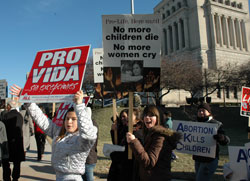Testimonials affirm sanctity of life at annual prayer service

Teenagers carry pro-life signs during the Right to Life of Indianapolis Memorial Walk on Jan. 27 in downtown Indianapolis. The memorial prayer service and walk commemorated the lives of more than 48 million unborn babies killed in abortions in the U.S. since 1973.
(Photo by Mary Ann Wyand)
By Mary Ann Wyand
Tearful testimonials affirmed the sanctity of life during the Right to Life of Indianapolis Memorial Service on Jan. 27 at the Indiana War Memorial in downtown Indianapolis.
The ecumenical pro-life prayer service commemorated the lives of more than 48 million unborn babies killed in abortions since the Supreme Court legalized Roe v. Wade and Doe v. Bolton in 1973. Those court cases made abortion legal in the U.S. during all nine months of pregnancy.
Holding a sign that read “I regret lost fatherhood,” Our Lady of the Most Holy Rosary parishioner Eric Slaughter of Indianapolis struggled to overcome tears of grief as he shared his story.
“I hold this sign as a witness,” he said. “About 25 years ago, my girlfriend at the time came to me and asked me to give her half of the money [she needed] to get an abortion. I didn’t know what abortion was, not really. I had planned to finish school, get married and have children. … But I didn’t have time to think about that because my girlfriend had decided what she wanted to do. I didn’t want to make her decision for her so I chose to support her, to be loving and caring.”
At her request, he withdrew $200 from his bank account and drove her to the abortion facility. He had intended to wait for her, but she told him not to stay so he went to work. When he called her the following day, she was angry with him.
“I did everything she wanted me to do,” Slaughter said. “I gave her the money, I took her to [the abortion facility] and I left her there. Was she mad because I hadn’t spoken up, that I hadn’t made her decision harder, or that I didn’t talk about keeping the baby or putting the baby up for adoption?
Or was she mad because I didn’t protect her and our baby? I don’t know.”
Gripping the podium, Slaughter looked at the gathering of several hundred pro-life supporters and said he thought it would become easier to share his story the more he talked about it. Then he sadly shook his head and continued his testimonial.
“I didn’t know what abortion was,” he said again. “I didn’t know. I didn’t know that someone was going to reach inside of her and pull our baby apart piece by piece from what should have been the safest place in the world. I had paid someone money to kill our baby.”
In recent years, Slaughter said he sought God’s mercy and forgiveness.
“I know his mercy is boundless,” he said. “There is still pain, but God’s grace sustains me. I know there are others, probably some in this room, who feel the emptiness, the loss—both men and women—and don’t understand it. We’ve been told to get over it. Men are told it’s not our choice so we should keep our feelings to ourselves. We should be a man. But that was my problem. I wasn’t a man. A man would have spoken up. A man would have protected his baby and the mother. But I didn’t know. … I said nothing. This is why I speak up and this is why I carry my sign—to help people, particularly men, to know what abortion is—because I didn’t know. I didn’t know then, but I know now that abortion is a lie.”
St. Therese of the Infant Jesus (Little Flower) parishioner Lara Johnson of Indianapolis, a nursing major at IUPUI, recently served as an intern for Right to Life of Indianapolis.
She began her talk by noting that the late President Ronald Reagan once said, “I noticed that everybody who is for abortion has already been born.”
Smiling, Johnson said, “I knew my mother was young when she gave birth to me. I did not realize the thought of my birth was a difficult and painful thought for my mother.”
On her 16th birthday, Johnson said, her mother, St. Patrick parishioner Amy True of Kokomo, Ind., gave her a “Precious Feet” pin representing the size of a 10-week-old unborn baby in the womb.
“With this [pin], she gave me a letter explaining how strongly she considered having an abortion,” Johnson said, “and how overjoyed she was by not choosing the thought that seemed like the easiest at the time. My mom was 16 when she became pregnant with me. She went to a Birthright clinic [in Kokomo], where through a pregnancy test a volunteer informed her of her pregnancy. The volunteer talked to my mom about the life growing inside of her, and gave her the ‘Precious Feet’ pin she later gave to me.”
Her mother wrote about how scared she was to be single, 16 and pregnant. After viewing a video of an abortion, she and her boyfriend decided to tell their parents and continue her pregnancy.
“My mom chose to give me life,” she said, wiping away tears of joy, “and for this I am grateful. I’m 21. … In the future, I will be a nurse. I will care for others. … I may get married and have children of my own someday—children who would not have been born if I were aborted. I will teach my children the respect for life that has been passed on to me.”†
